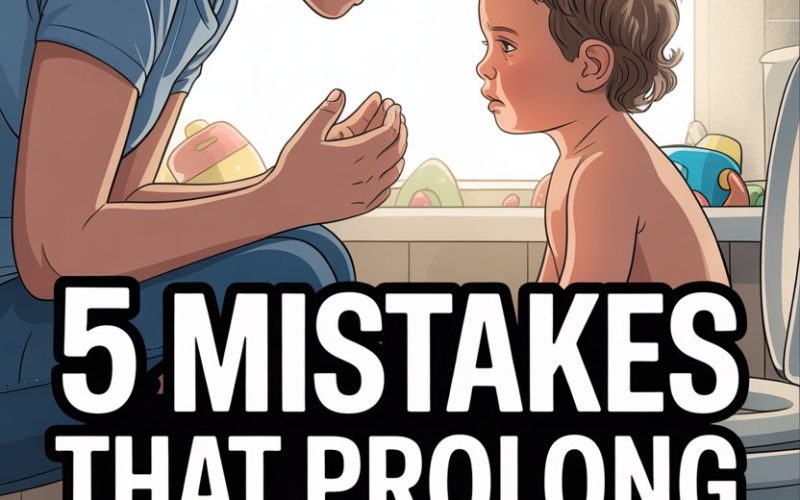Potty training: that magical time when your little cherub transforms from nappy-wearing tot to proud pants-wearing human. It’s also the time when parents find themselves muttering, “How is it possible for someone so small to have so much pee?”
If your child’s been stuck in potty limbo longer than a British queue at the post office, it’s likely some classic mistakes are at play.
Tired of Googling “Why won’t my kid use the potty?” during your only quiet moment (i.e., hiding in the loo yourself)?
Here’s what might be dragging potty training out—and how to turn things around faster than you can say “Who left this puddle?”
1. Expecting Success Before Your Child Is Actually Ready
Every parent knows at least one child prodigy who was dry at 18 months. Their parent looks at you with those “Oh, you’re still in nappies?” eyes. Ignore them.
Rushing into potty training before your child shows true readiness is like trying to bake a cake at 150°C and wondering why it’s still gooey inside.
Common signs of readiness include staying dry for an hour or two, showing interest in what’s happening in the bathroom, and being able to follow simple directions—sometimes even wanting to copy you (the ultimate flattery!).
According to the American Academy of Pediatrics, most kids are not ready until between 18 and 24 months, and plenty are closer to three.
Some children wave at the toilet and declare, “No thanks!” for a little longer, and that’s fine.
When readiness isn’t present, accidents multiply, frustration mounts, and you all end up resenting the sight of the training potty lurking in the corner.
If you started and things aren’t going well after a couple of weeks, it’s not a sign of failure—it’s a sign to pause, wait a few weeks, and try again.
2. Turning the Potty into a Power Struggle
Toddlers are famous for their strong opinions. On everything. Potty training is the one area where they have almost total control, and they know it.
If you’re pushing harder than a rugby scrum, you’ve probably seen your child become even more determined to do the opposite.
Offering rewards, charts, and the promise of a shiny new toy is all well and good—unless it turns into an expectation or a battleground. Pressure (even the subtle kind) can backfire spectacularly.
According to child psychologist Dr. Heather Wittenberg, when kids sense you care deeply about the outcome, some instinctively dig in their heels as a way to assert independence.
Turning potty time into something lighthearted and relaxed helps. Keep the mood upbeat, praise attempts (not just success), and avoid punishment.
If you find yourself in a stand-off, step back and let your child take the lead for a few days. You might be surprised by what happens when the pressure’s off.
3. Sending Mixed Messages
There’s nothing more confusing for a toddler than inconsistency.
One day, you’re cheering at the sight of a wee in the potty, the next day you’re too busy to remind them, and then out and about you quietly slip on a nappy “just in case.”
Mixed messages around what’s expected and when can really slow progress.
If you’re expecting your child to use the toilet at home but not at Grandma’s, or if sometimes the potty is important and other times not, it’s a recipe for confusion.
Consistency doesn’t mean you have to be a drill sergeant. It just means keeping routines and expectations as similar as possible.
If you need to go out, try pull-up training pants that feel less like nappies but contain accidents. Talk to caregivers, nursery staff, and grandparents so everyone’s singing from the same potty-training hymn sheet.
Staying patient during inevitable setbacks helps your child feel secure. Regression during illness, big life changes (new sibling, moving house), or stress is normal.
React calmly: “Whoops, accidents happen. Next time we’ll try the potty again!”
4. Missing the Magic Window of Interest
Ever notice a brief stretch when your child is obsessed with all things toilet-related? Maybe they follow you into the loo, ask hard questions about bodily functions (cheers, children’s curiosity), or want to flush for you.
This is the “magic window”—a golden opportunity for potty training success.
Miss this phase, and the window can slam shut, often replaced by a cool indifference—or worse, resistance.
According to research published in Pediatrics, beginning training during a window of interest tends to result in fewer accidents and faster overall success.
If you sense your child’s curiosity flickering, embrace it! Let them pick out undies, watch you “model” toilet use, and make sitting on the potty part of the pre-bath routine.
Treat the potty as an exciting new privilege rather than a chore. Keep books and toys nearby, sing silly songs, and make it a positive experience.
If the interest fades, don’t panic; wait for signs it’s returning and avoid pushing through a closed door (or, in this case, lid).
5. Letting Accidents Steal the Show
Nothing dials up the stress faster than a puddle on the carpet right after you thought progress was being made. Some parents respond with frustration or disappointment, and others leap straight to cleaning up in a panic.
Sometimes it’s the third accident in a single hour and you start to question your life choices.
Here’s the big secret: accidents are not just normal, they’re an essential part of the process. In fact, they’re often the best teachers.
According to pediatric urologist Dr. Steve Hodges, treating accidents as information rather than failures helps everyone stay sane. Your child isn’t being naughty or lazy—they’re still learning body signals.
Respond with a neutral, matter-of-fact attitude. “Oops, looks like pee came out. Next time, we’ll try the potty.” Avoid shaming or scolding, and skip the dramatic sigh (save that for bedtime).
If you see a pattern—always wet after meals, or during a favourite cartoon—gently prompt before those times.
Keep spare clothes at the ready, wipes on standby, and maybe a sense of humour tucked in your back pocket. You’ll need it.
Potty Training Without Losing Your Marbles
Potty training can feel like one long, soggy experiment, but it doesn’t have to stretch on and on. Spotting and sidestepping these five common mistakes can make a world of difference—and save you countless loads of washing.
Wait for your child’s signals, keep things light-hearted, stay consistent, watch for windows of readiness, and treat accidents as learning opportunities (not disasters). With a little patience and a lot of spare pants, you’ll get there—eventually.
And just think: one day soon, the potty will be a relic gathering dust in the cupboard, and you’ll barely remember this soggy chapter.
Until then, solidarity, strong coffee, and may your floors stay (mostly) dry.




